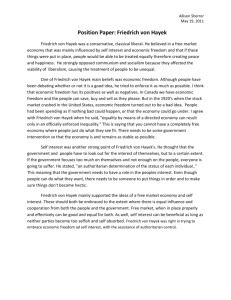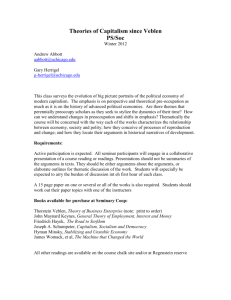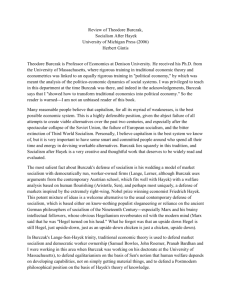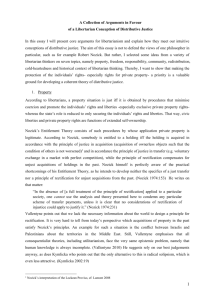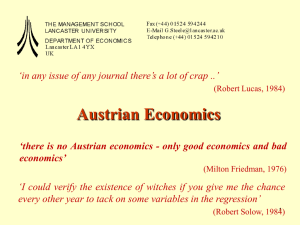Methodological individualism and society: Hayek`s evolving view
advertisement
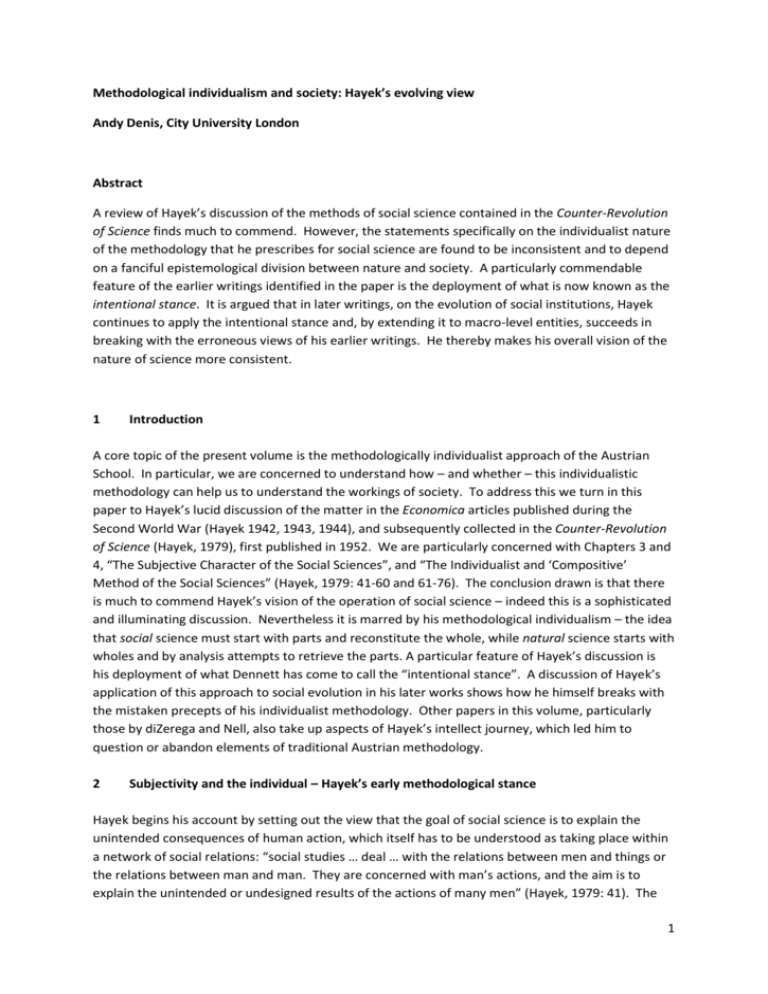
Methodological individualism and society: Hayek’s evolving view Andy Denis, City University London Abstract A review of Hayek’s discussion of the methods of social science contained in the Counter-Revolution of Science finds much to commend. However, the statements specifically on the individualist nature of the methodology that he prescribes for social science are found to be inconsistent and to depend on a fanciful epistemological division between nature and society. A particularly commendable feature of the earlier writings identified in the paper is the deployment of what is now known as the intentional stance. It is argued that in later writings, on the evolution of social institutions, Hayek continues to apply the intentional stance and, by extending it to macro-level entities, succeeds in breaking with the erroneous views of his earlier writings. He thereby makes his overall vision of the nature of science more consistent. 1 Introduction A core topic of the present volume is the methodologically individualist approach of the Austrian School. In particular, we are concerned to understand how – and whether – this individualistic methodology can help us to understand the workings of society. To address this we turn in this paper to Hayek’s lucid discussion of the matter in the Economica articles published during the Second World War (Hayek 1942, 1943, 1944), and subsequently collected in the Counter-Revolution of Science (Hayek, 1979), first published in 1952. We are particularly concerned with Chapters 3 and 4, “The Subjective Character of the Social Sciences”, and “The Individualist and ‘Compositive’ Method of the Social Sciences” (Hayek, 1979: 41-60 and 61-76). The conclusion drawn is that there is much to commend Hayek’s vision of the operation of social science – indeed this is a sophisticated and illuminating discussion. Nevertheless it is marred by his methodological individualism – the idea that social science must start with parts and reconstitute the whole, while natural science starts with wholes and by analysis attempts to retrieve the parts. A particular feature of Hayek’s discussion is his deployment of what Dennett has come to call the “intentional stance”. A discussion of Hayek’s application of this approach to social evolution in his later works shows how he himself breaks with the mistaken precepts of his individualist methodology. Other papers in this volume, particularly those by diZerega and Nell, also take up aspects of Hayek’s intellect journey, which led him to question or abandon elements of traditional Austrian methodology. 2 Subjectivity and the individual – Hayek’s early methodological stance Hayek begins his account by setting out the view that the goal of social science is to explain the unintended consequences of human action, which itself has to be understood as taking place within a network of social relations: “social studies … deal … with the relations between men and things or the relations between man and man. They are concerned with man’s actions, and the aim is to explain the unintended or undesigned results of the actions of many men” (Hayek, 1979: 41). The 1 aspect of human action with which we are concerned is choice: “The social sciences … are concerned with man’s conscious or reflected action, actions where a person can be said to choose between various courses open to him” (Hayek, 1979: 42-3). This aspect of the study of society – which for Hayek is foundational – is accessible to us because we can resort to Verstehen: “We know … that in his conscious decisions man classifies external stimuli in a way which we know solely from our own subjective experience” (Hayek, 1979: 43). So when we study the unintended consequences of human action, we can understand the behaviour of the mass, of “many men”, because, when they make their choices, they base them on a classification of stimuli – an understanding of their interaction with their environment – which we can understand by virtue of our own subjective experience. In adopting this stance – one which I whole-heartedly endorse – Hayek places the application of what Dennett refers to as the “intentional stance” at the core of the investigation of society. To do otherwise, Hayek says, would be “impossible” (Hayek, 1979: 44). Dennett explains the intentional stance as follows: first you decide to treat the object whose behavior is to be predicted as a rational agent; then you figure out what beliefs that agent ought to have, given its place in the world and its purpose. Then you figure out what desires it ought to have, on the same considerations, and finally you predict that this rational agent will act to further its goals in the light of its beliefs. A little practical reasoning from the chosen set of beliefs and desires will in most instances yield a decision about what the agent ought to do; that is what you predict the agent will do. (Dennett, 1996: 17) This is Hayek’s procedure. He focuses on the individual economic agent, considering both his goals and his beliefs about the likely consequences of his actions, given his place in the world, his location within a network of relationships. Hayek underlines that the social entities that we study and are to explain are socially valid abstractions. Such entities are “abstractions from all the physical attributes of the things in question … their definition must run entirely in terms of mental attitudes of men”. They exist – that is, they have social validity – because people believe that they exist: “most of the objects of social or human action are not “objective facts” … and they cannot at all be defined in physical terms. So far as human actions are concerned the things are what the acting people think they are” (Hayek, 1979: 44). Up to this point, Hayek has quickly sketched a profoundly sophisticated vision in which the objects of social science are socially valid entities, determined by mental attitudes of economic agents, but arising behind their backs as unintended consequences of their choices. But this immediately raises an interesting issue: “The objects or the ‘facts’ of the social sciences are also opinions … opinions of those whose actions produce the objects of the social scientist” (Hayek, 1979: 47). So agents have opinions and these opinions both are the facts of social science, and they produce the facts of social science. The facts of social science are both cause and effect – the beliefs which lead to action, and the actions which then lead to beliefs. So should we regard social facts as objective or subjective? These social facts “are thus as little ‘subjective’ as those of the natural sciences, because they are independent of the particular observer”. “But in another sense … the facts of the social sciences are 2 merely opinions, views held by the people whose actions we study.” They are both subjective and objective, views held by people en masse, but independent of the will of individuals – that is, they are socially valid abstractions. Thus, according to Hayek, beliefs “as such are our data, irrespective of whether they are true or false … moreover, we cannot directly observe [them] in the minds of the people but … we can recognize [them] from what they do and say merely because we have ourselves a mind similar to theirs”. To underline this point, Hayek adds that even when we bring physical reality into play, it can only exert an influence via its effect on consciousness: “all the ‘physical laws of production’ which we meet, for example, in economics, are not physical laws in the sense of the physical sciences, but people’s beliefs about what they can do” (Hayek, 1979: 52). Hence “the relations between men … for the purposes of social study cannot be defined in the objective terms of the social sciences but only in terms of human beliefs” (Hayek, 1979: 52). The content of social science is simply and purely belief: “Not only man’s action toward external objects but also all the relations between men and all the social institutions can be understood only by what men think about them” (Hayek, 1979: 57). Hayek describes this as “the subjectivist approach of the social sciences”, and in his view “every important advance in economic theory during the last hundred years was a further step in the consistent application of subjectivism” in this sense: “Society as we know it is, as it were, built up from the concepts and ideas held by the people; and social phenomena can be recognized by us and have meaning to us only as they are reflected in the minds of men” (Hayek, 1979: 58). Society is “built up” of socially valid ideas, ideas and beliefs which have validity, that is, social efficacy, regardless of their objective truth, and it is the job of the social scientist to retrace that building up by connecting these ideas to reconstitute the social structure, the unintended consequence of human decisions. But “it is … the individual concepts, the views people have formed of each other and of the things, which form the true elements of the social structure” (Hayek, 1979: 58). These mutual beliefs constitute relationships between people and it is the network of these relationships in which the individual is embedded and within which he makes his decisions: “If the social structure can remain the same although different individuals succeed each other at particular points, this is not because the individuals which succeed each other are completely identical, but because they succeed each other in particular relations … The individuals are merely the foci in the network of relationships”. The nodes or focuses of the networks of relations are social rôles, occupied by individuals. The social structure is thus a set of social relations, a “network of relationships” within which individuals are embedded, and which leads to similarity, or at least congruence, of individual behaviour, such that the social structure “remains the same”, despite changes of personnel. Individuals succeed each other within that set of relations, that is, they inherit rôles. The relationships between people are constituted by the “attitudes they take toward other people” and the “particular views held by other people about them” – “it is the various attitudes of the individuals toward each other … which form the recurrent, recognizable and familiar elements of the structure”. So the social relationships are the mutual expectations which agents have of each other – expectations which themselves depend upon the roles that individuals play. Hayek gives the example of a policeman. The expectations he has of others, and the expectations that they have of 3 him – in his rôle as a policeman, those “which are relevant to his function as policeman”, “preserve a constant structural element which can be separated and studied in isolation” (Hayek, 1979: 59). This is a profound and sophisticated account. But recall that the goal is to explain the unintended macro-level consequences of individual action. Hayek at this point, towards the end of Chapter 3, now introduces a very important and subtle consequence of what he has said so far: While we can recognize these elements of human relationships only because they are known to us from the working of our own minds, this does not mean that the significance of their combination in a particular pattern relating different individuals must be immediately obvious to us. It is only by the systematic and patient following up of the implications of many people holding certain views that we can understand … the unintended and often uncomprehended results of the separate yet interrelated actions of men in society. (Hayek, 1979: 59 – my emphasis) So we can use Verstehen to understand why people do what they do – the choices they make, etc, but the wider social significance of those actions in the form of a pattern of relationships relating the individuals in society, that is, the unintended consequences of those choices, cannot be understood in the same way. They are unintended, so our empathy with others’ goals and intentions is of no assistance. So how are we to understand them? The answer is, by the exercise of the synthetic power of the mind. At this point this is stated in general terms, indicating merely the “systematic and patient following up” of the implications of belief, and the “effort to reconstruct these different patterns of social relations”. The question is addressed more fully in the next chapter, on “The Individualist and ‘Compositive’ method of the Social Sciences” (Hayek, 1979: 61-76). Hayek starts his discussion of methodological individualism per se, or the individualist method, with the idea that the entities which social scientists study, socially valid ideas, appear twice: “The special difficulties of the social sciences, and much confusion about their character, derive precisely from the fact that in them ideas appear in two capacities, as it were, as part of their object, and as ideas about that object” (Hayek, 1979: 61). In social sciences, he says, “it is necessary to draw a distinction between those ideas which are constitutive of the phenomena we want to explain and the ideas which either we ourselves or the very people whose actions we have to explain may have formed about these phenomena and which are not the cause of, but theories about the social structures” (Hayek, 1979: 62). This is particularly important because the people whose behaviour we are studying “form ideas about the undesigned results of their actions – popular theories about the various social structures or formations” (Hayek, 1979: 62). “The real contrast is between ideas which by being held by the people become the cause of a social phenomenon and the ideas which people form about that phenomenon” (Hayek, 1979: 62-3). It is important to distinguish between “the motivating or constitutive opinions on the one hand and speculative or explanatory views which people have formed” (Hayek, 1979: 64) on the other. So not only are individual agents driven by mutual expectations in making the choices they make, but they also form ideological views about the unintended consequences of those choices – a folk political economy, as it were. And those views will also influence the choices that people make. It is the task of the social scientist to expose what is true and what is false in these folk conceptions: “our study has to revise and improve” them. 4 For Hayek, there is a further dimension, and that dimension is critically important for our investigation. He identifies constitutive ideas as ideas which constitute the behaviour of the individual person, the choices that he makes. We have already seen this in the discussion up to this point. The ideas which the policeman, and those he comes into contact with, hold about his behaviour and the way others will respond to his actions, are constitutive of his choices. They are the constant structural component which is the object of social science. But the notions of folk political economy concern social “wholes”. This is because they are folk explanations of the unintended consequences of individual action for the society – they are about the social structure or social formation which emerges undesignedly from individual choice. They are about “the causes of [a] change in price or about the ‘nature of value’ in general … ideas they may have formed about the whole of ‘society,’ or the ‘economic system,’ to which they belong” (Hayek, 1979: 63). So the “popular mind” may form ideas about “such collectives as society or the economic system”, but the social scientist must “refrain from treating these pseudo-entities as facts”, and “systematically start from the concepts which guide individuals in their actions” (Hayek, 1979: 64). Starting instead from the proposed higher-level entities treats “as facts those collectives which are no more than popular generalizations” (Hayek, 1979: 65). This, according to Hayek, betrays a “collectivist prejudice” (Hayek, 1979: 65). There is a jump here, a hiatus in the logical train of thought. It may be true that a scientific explanation of some phenomenon unintended by the human agents whose action underpins it is incomplete until it has been shown to be consistent with some set of choices and hence with a set of constitutive ideas. But that certainly doesn’t mean that an analysis of such a set of phenomena is necessarily either false or useless until it has that quality of completeness. Moreover, it may not be possible to get to the explanation of the unintended consequence starting with the behaviour of individuals. Two discussions which Hayek engages in elsewhere are relevant here. At the end of The Sensory Order, in the chapter on ‘Philosophical Consequences’, in the section on ‘Dualism and Materialism’, Hayek says the following about the relationship between our studies of the ‘microcosm’ or physical world, and the corresponding ‘macrocosm’ or mental world: While our theory leads us to deny any ultimate dualism of the forces governing the realms of mind and that of the physical world respectively, it forces us at the same time to recognize that for practical purposes we shall always have to adopt a dualistic view .... [A]ny explanation of mental phenomena which we can hope ever to attain cannot be sufficient to ‘unify’ all our knowledge, in the sense that we should become able to substitute statements about particular physical events (or classes of physical events) for statements about mental events .... [W]e shall never be able to bridge the gap between physical and mental phenomena; and for practical purposes ... we shall permanently have to be content with a dualistic view of the world.” (Hayek, 1952: 179) Again, earlier in The Counter-Revolution of Science, Hayek makes the same point. Discussing the study of individual choice and its social consequences, he says that “The external stimulus which may be said to cause or occasion such actions can of course also be defined in purely physical terms. 5 But if we tried to do so for the purposes of explaining human action, we would confine ourselves to less than we know about the situation” (Hayek, 1979: 43). Let us try to apply the same mode of thought to the relationship between the social microcosm – the individual making choices embedded within a network of social relationships, and the corresponding macrocosm – the unintended social outcomes of such decision making, including the network of social relationships itself. Then we might say that although there is no ultimate dualism between micro and macro, it may be that – perhaps for the foreseeable future – we have to adopt a dualistic view. An explanation of social phenomena which we can hope currently to attain cannot be sufficient to ‘unify’ all our knowledge, in the sense that we should become able to substitute statements about particular individual choice events (or classes of such events) for statements about social events. In our discussion of social events, to attempt to confine ourselves to individual events is to confine ourselves to less than we know. At the very least, if this strategy is not open to us, it is up to Hayek to explain why that is so. We will have more to say on this in the sequel. For Hayek, therefore, we must start with the micro, the socially embedded individual, and build up the macro therefrom. Hayek thus implicitly endorses a version of the microfoundations project. In the social sciences it is the concepts and views held by individuals which are directly known to us and which form the elements from which we must build up, as it were, the more complex phenomena … it is the attitudes of individuals which are the familiar elements and by the combination of which we try to reproduce the complex phenomena, the results of individual actions, which are much less known – a procedure which often leads to the discovery of principles of structural coherence of the complex phenomena which had not been (and perhaps could not be) established by direct observation (Hayek, 1979: 65). The natural sciences, on the contrary, “necessarily begin with the complex phenomena of nature and work backward to infer the elements from which they are composed” (Hayek, 1979: 65-66). Hayek thus regards the difference between the social and natural sciences as expressing a partwhole relation: The place where the human individual stands in the order of things brings it about that in one direction what he perceives are the comparatively complex phenomena which he analyzes, while in the other direction what are given to him are elements from which those more complex phenomena are composed that he cannot observe as wholes. While the method of the natural sciences is in this sense, analytic, the method of the social sciences is better described as compositive or synthetic. (Hayek, 1979: 66-7) In the social sciences, in Hayek’s view, we only learn about totalities by means of synthesis, the ‘compositive’ method, by systematically ‘fitting together’ the elements, which are the mutual expectations of agents, to construct the entity in the mind: “It is the so-called wholes, the groups of elements which are structurally connected, which we learn to single out from the totality of observed phenomena only as a result to our systematic fitting together of the elements with familiar properties, and which we build up or reconstruct from the known properties of the elements” (Hayek, 1979: 67). 6 So for the social sciences we follow methodological individualism – we start with the known intended actions in the context of the set of relationships determining mutual expectations of the economic agents and build up from there to reconstruct the resultant unknown and unintended social totalities. We derive “laws of the macrocosm” from our “knowledge of the microcosm” and these laws “always remain ‘deductive’” because of “limited knowledge of the data of the complex situation” (Hayek, 1979: 72-3). For the natural sciences, however, we adopt the opposite path of methodological holism and start with the known wholes, proceeding by analysis to retrieve the unknown parts. In my view we cannot accept Hayek’s proposal to partition the world into a non-social field, in which we proceed by analysis, and a social one, in which we proceed by synthesis. Marx, too, seems to privilege synthesis, though for different reasons: synthesis, he says, “is obviously the scientifically correct method” (Marx, 1973: 101). In reality, science in both fields consists of a continual alternation between analysis and synthesis. Reality as it presents itself to us is always a complex unity of many determinations. We progress by analysing what we see into simpler categories which we then mentally recombine to reproduce the concrete as mentally concrete (Marx, 1973: 101). The botanist sees the individual plants, or perhaps, from a distance, the woodland, fields, and so on, without discerning the individual organisms. He does not see species or phyla, or photosynthesis or transpiration. These totalities have to be continually reconstructed in thought via analysis and synthesis. Hayek’s view, taken literally, would imply that the social scientist can never see the wood for the trees, and the natural scientist the trees for the wood. To take the behaviour of the economic agent. He may make marginal choices to work, or to borrow, but these choices depend on the presence of opportunities to work and to borrow, and those opportunities – the structure of the incentives facing him – depend upon the operation of the labour and credit markets. The behaviour of the agent cannot be understood except in the context of the dense network of social relations within which he is embedded. Hayek knows that the network of relationships cannot be reduced to a logically prior asocial individual. But equally it cannot be reduced to the individual choice – choice in his vision is social choice and depends upon social context. He says explicitly that it is the social context, the network of relations which can be separated and studied “in isolation”. But then he falls back on the notion of ‘starting’ from the individual – because the individual is said to be what we already know, because we have a mind like his. But the context, the network of relationships is not something we know initially – it has to be deduced from what people do and reconstructed in our thought. Hayek here is inconsistent. 3 The theory of the evolution of society: Hayek’s later shift away from methodological individualism Hayek’s thought expressed in his war-time writings is inconsistent on this point. But in the subsequent evolution of his thought he overcomes this inconsistency and thereby renders his thought more profound. He does this by consistently applying the intentional stance – not limiting it to the individual agent, but extending its field of application to social phenomena. This section of the paper considers the methodological step forward, and away from methodological individualism, represented by Hayek’s writings on the evolution of social institutions. In Hayek’s theory of social evolution, the social context within which the socially embedded individual acts is codified as a “system of rules of individual conduct”, and the unintended social 7 consequence of his decisions according to that system of rules of individual conduct is the “overall order of the actions of a group of individuals” (Hayek, 1967: 67-68): transmission of rules of conduct takes place from individual to individual, while what may be called the natural selection of rules will operate on the basis of the greater or lesser efficiency of the resulting order of the group …The evolutionary selection of different rules of individual conduct operates through the viability of the order it will produce (Hayek, 1967: 68). Because this ‘overall order’ is unintended, it is also often uncomprehended. It is what the members of the social group depend upon for their livelihoods, and in order to survive they must sustain it. But they do not know that. The rules of conduct which guide a society are functional, according to Hayek. Individuals must behave so as to preserve those functions, but they will not necessarily be able to understand them: the ‘functions’ which these rules serve we shall be able to discover only after we have reconstructed the overall order which is produced by actions in accordance with them ... all the individuals of the species which exist will behave in that manner because groups of individuals which have thus behaved have displaced those which did not do so. (Hayek, 1967: 70) So we have a situation quite different from what we started with, in the Counter-Revolution of Science. There, the individual did what he did, motivated by his own interests, and according to what he thought the consequences would be for those interests from acting in particular ways. These actions had unintended social consequences, but no attention was given to the consequences to all the individuals from these social outcomes. Now, in Studies in Philosophy, Politics and Economics, we have a second rationality running alongside that of the individual agents. The “overall order of actions of the group” determines the fate of the individuals. Hayek expresses this second rationality as a sort of inversion of the relation between cause and effect in the sense that the structures possessing a kind of order will exist because the elements do what is necessary to secure the persistence of that order. The ‘final cause’ or ‘purpose’, i.e., the adaptation of the parts to the requirements of the whole, becomes a necessary part of the explanation of why structures of the kind exist: we are bound to explain the fact that the elements behave in a certain way by the circumstance than this sort of conduct is more likely to preserve the whole on the preservation of which depends the preservation of the individuals, which would therefore not exist if they did not behave in this manner. A ‘teleological’ explanation is thus entirely in order so long as it does not imply design by a maker but merely the recognition that the kind of structure would not have perpetuated itself if it did not act in a manner likely to produce certain effects, and that it has evolved through those prevailing at each stage who did. (Hayek, 1967: 77) The social structure persists because the human elements of that structure do, without knowing it, whatever is necessary to preserve it – the parts are adapted to the requirements of the whole. But this reverses the picture we were given earlier. It is now impossible to ‘start’ from the (socially embedded) individual and ‘build up’ the social order that emerges undesigned from his choices. On 8 the contrary, we have to know about the social order, the traditions which constitute it, and the systems of rules of individual conduct, to make sense of the actions of the individual agents: the order which will form as the result of these actions is of course in no sense ‘part of the purpose’ or of the motive of the acting individuals. The immediate cause, the impulse which drives them to act, will be something affecting them only … while this consequence … is wholly beyond their knowledge or intentions. (Hayek, 1967: 77) The social scientist therefore has to keep in mind two rationalities – the ‘immediate cause’ of action, which concerns only the actor, and the ultimate or ‘final’ cause or purpose, the maintenance of the social entity we are considering. Neither makes sense without the other. We are now applying the intentional stance at a collective level, just as Dennett himself does: There is no substitute for the intentional stance. Either you adopt it, and explain the pattern by finding the semantic-level facts, or you will forever be baffled by the regularity – the causal regularity – that is manifestly there … Even if you can describe, in matchless microdetail, every causal fact in the history of every giraffe who has ever lived, unless you go up a level or two and ask “Why?” … you will never be able to explain the manifest regularities, such as the fact that giraffes have come to have long necks. (Dennett, 1995: 421) So we are presented with syntactic-level facts, facts about the rules determining the micro-level choices of the individual agent, and semantic-level facts, facts about their meaning, their function for the social order. To explain the manifest regularities – the instances of social coordination and discoordination – we cannot confine ourselves to the former. We cannot start with the micro-level choices of the individual agent and build up, because we are failing to ask ‘Why?’. Not why the individual does what he does – that is in response to his incentives: we can all agree on the immediate cause. But why the incentives guide the individual to this outcome rather than that – what is the purpose, or ‘final cause’. The system of incentives facing the individual fulfil that purpose because this is functional for the social entity within which the individual is operating – but that can never be understood by applying Verstehen to the behaviour of the individual. In his discussion of social evolution, Hayek invokes the intentional stance at a collective level – he asks what is necessary to serve a rationality at a higher level than that of the individual human being: “Frequently the behaviour of the individual is determined by his success in maintaining himself as part of a certain system within which it is … the whole system to which he has adapted that determines his behaviour. For this reason, value … can only be understood as the determinant of what people must do to maintain the overall structure” (Hayek, 1983: 36). So for Hayek the individual has to adapt to the rationality of the system, and it is the system that determines the behaviour of the individual. What we think of as value is just a signal to us to act in accordance with the needs of the higher rationality of the system. To try to exclude this, to build an account purely in terms of the rationality of the individual would be to “confine ourselves to less than we know about the situation”. In his work on the evolution of social orders, Hayek thus abandons the individualist methodology he had proposed in his war-time writings, thereby rectifying the inconsistency that that precept implied for the system of his thought. In moving away from what he wrote in the 1940s, Hayek is also moving further away from the founders of the Austrian school. This cannot be dealt with fully here, and forms the subject of 9 further research. Nevertheless, as a footnote to what has gone before, we may compare Hayek’s stance here with that of Mises in Human Action (Mises, 1996). Under the rubric of “The Principle of Methodological Individualism”, Mises explains that “Praxeology deals with the actions of individual men. It is only in the further course of its inquiries that cognition of human cooperation is attained and social action is treated as a special case of the more universal category of human action as such” (Mises, 1996: 41). For Mises, ‘social action’ is clearly to be subsumed under individual action, as a special case of the latter. As will be apparent from the discussion above, this is wholly at odds with Hayek’s approach, according to which individual actions can only be understood once we understand the social entities for which those actions are functional. We should note that even Hayek’s initial standpoint diverges from Mises here: even when Hayek held that social science should start with individuals and build up, the individual was conceived as a node embedded in a nexus of social relations, but there is no hint of such an insight in Mises’s account. Collective wholes or social entities do indeed exist for Mises, but they can be understood, and indeed only understood, via the individual actions which they consist of: “If we scrutinize the meaning of the various actions performed by individuals we must necessarily learn everything about the actions of collective wholes … the way to a cognition of collective wholes is through an analysis of the individuals’ actions” (Mises, 1996: 42). The notion that social entities have their own logic is utterly foreign to this standpoint. Whereas for Hayek, standing on the shoulders of Adam Smith and Adam Ferguson, the focus of social science is always the unintended outcomes of purposive behaviour, it is remarkable, indeed diagnostic, that in the 900-odd pages of Human Action there is but one reference to unintended outcomes – and that one occasion is an explanation that a specific social phenomenon is not an unintended outcome of intentional behaviour (Mises, 1996: 449). 4 Conclusion This paper has considered the methodological stance which Hayek prescribed in his war-time writings, identifying what within it can and cannot be sustained. While much there was found to be commendable, his specifically individualist methodological prescription was found to be questionable. The paper suggests that in his later writings on evolution he shifts way from the methodologically individualist precepts expressed in the earlier work. A particular issue of interest uniting the narrative has been the focus on Daniel Dennett’s intentional stance. It was argued that Hayek’s earlier writings expressed and indeed were enriched by the adoption of this standpoint. Moreover, the article suggests that Hayek’s later writings, on the topic of the evolution of social institutions, continued to apply the intentional stance, but by extending its field of application beyond that of the individual human actor, broke with his earlier and more limited views. This article has not made any attempt to appraise Hayek’s evolutionary theory, a topic which is addressed in Denis (2002). Though the extent to which Hayek’s view can be taken as representing the Austrian school – its consistency or otherwise with, for example, the views of Menger and Mises – is not addressed here and constitutes the topic of further work in this area, hints are found in Mises magnum opus, Human Action, that strongly suggest that Hayek is in many respects something of an outlier within the Austrian school, so far as these issues are concerned. 10 Bibliography Andy Denis (2002) “Was Hayek a Panglossian Evolutionary Theorist? A Reply to Whitman” Constitutional Political Economy 13 (3): 275-285. Daniel C. Dennett (1996) The Intentional Stance, Cambridge, Ma: The MIT Press. Daniel C Dennett (1995) Darwin’s Dangerous Idea. Evolution and the meanings of life London: Penguin. F. A. v. Hayek (1942) “Scientism and the Study of Society. Part I” Economica New Series, 9 (35), Aug: 267-291. F. A. v. Hayek (1943) “Scientism and the Study of Society. Part II” Economica New Series, 10 (37), Feb: 34-63. F. A. v. Hayek (1944) “Scientism and the Study of Society. Part III” Economica New Series, 11 (41), Feb: 27-39. FA Hayek (1952) The Sensory Order. An Inquiry into the Foundations of Theoretical Psychology London: Routledge & Kegan Paul. F.A. Hayek (1967) Studies in Philosophy, Politics and Economics London: Routledge & Kegan Paul. F.A. Hayek (1979) The Counter-Revolution of Science, 2nd ed, Indianapolis: LibertyPress. Friedrich Hayek (1983) Knowledge, Evolution and Society London: Adam Smith Institute. Karl Marx (1973) Grundrisse. Foundations of the Critique of Political Economy (Rough Draft) Harmondsworth: Penguin for New Left Review. Ludwig von Mises (1996) Human Action. Fourth edition, San Francisco: Fox & Wilkes. 11


